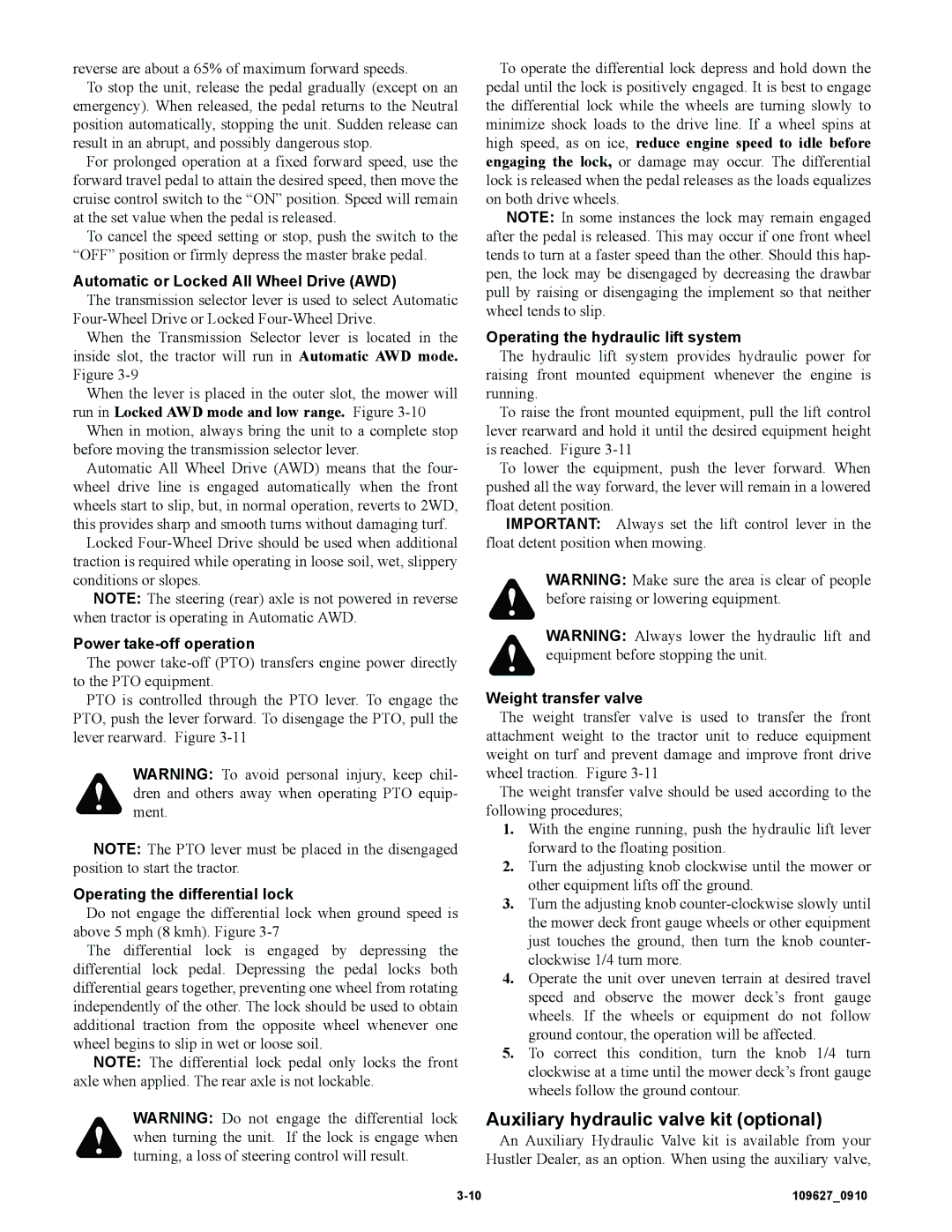
reverse are about a 65% of maximum forward speeds.
To stop the unit, release the pedal gradually (except on an emergency). When released, the pedal returns to the Neutral position automatically, stopping the unit. Sudden release can result in an abrupt, and possibly dangerous stop.
For prolonged operation at a fixed forward speed, use the forward travel pedal to attain the desired speed, then move the cruise control switch to the “ON” position. Speed will remain at the set value when the pedal is released.
To cancel the speed setting or stop, push the switch to the “OFF” position or firmly depress the master brake pedal.
Automatic or Locked All Wheel Drive (AWD)
The transmission selector lever is used to select Automatic
When the Transmission Selector lever is located in the inside slot, the tractor will run in Automatic AWD mode. Figure
When the lever is placed in the outer slot, the mower will run in Locked AWD mode and low range. Figure
When in motion, always bring the unit to a complete stop before moving the transmission selector lever.
Automatic All Wheel Drive (AWD) means that the four- wheel drive line is engaged automatically when the front wheels start to slip, but, in normal operation, reverts to 2WD, this provides sharp and smooth turns without damaging turf.
Locked
NOTE: The steering (rear) axle is not powered in reverse when tractor is operating in Automatic AWD.
Power take-off operation
The power
PTO is controlled through the PTO lever. To engage the PTO, push the lever forward. To disengage the PTO, pull the lever rearward. Figure
WARNING: To avoid personal injury, keep chil- dren and others away when operating PTO equip- ment.
NOTE: The PTO lever must be placed in the disengaged position to start the tractor.
Operating the differential lock
Do not engage the differential lock when ground speed is above 5 mph (8 kmh). Figure
The differential lock is engaged by depressing the differential lock pedal. Depressing the pedal locks both differential gears together, preventing one wheel from rotating independently of the other. The lock should be used to obtain additional traction from the opposite wheel whenever one wheel begins to slip in wet or loose soil.
NOTE: The differential lock pedal only locks the front axle when applied. The rear axle is not lockable.
WARNING: Do not engage the differential lock when turning the unit. If the lock is engage when turning, a loss of steering control will result.
To operate the differential lock depress and hold down the pedal until the lock is positively engaged. It is best to engage the differential lock while the wheels are turning slowly to minimize shock loads to the drive line. If a wheel spins at high speed, as on ice, reduce engine speed to idle before engaging the lock, or damage may occur. The differential lock is released when the pedal releases as the loads equalizes on both drive wheels.
NOTE: In some instances the lock may remain engaged after the pedal is released. This may occur if one front wheel tends to turn at a faster speed than the other. Should this hap- pen, the lock may be disengaged by decreasing the drawbar pull by raising or disengaging the implement so that neither wheel tends to slip.
Operating the hydraulic lift system
The hydraulic lift system provides hydraulic power for raising front mounted equipment whenever the engine is running.
To raise the front mounted equipment, pull the lift control lever rearward and hold it until the desired equipment height is reached. Figure
To lower the equipment, push the lever forward. When pushed all the way forward, the lever will remain in a lowered float detent position.
IMPORTANT: Always set the lift control lever in the float detent position when mowing.
WARNING: Make sure the area is clear of people before raising or lowering equipment.
WARNING: Always lower the hydraulic lift and equipment before stopping the unit.
Weight transfer valve
The weight transfer valve is used to transfer the front attachment weight to the tractor unit to reduce equipment weight on turf and prevent damage and improve front drive wheel traction. Figure
The weight transfer valve should be used according to the following procedures;
1.With the engine running, push the hydraulic lift lever forward to the floating position.
2.Turn the adjusting knob clockwise until the mower or other equipment lifts off the ground.
3.Turn the adjusting knob
4.Operate the unit over uneven terrain at desired travel speed and observe the mower deck’s front gauge wheels. If the wheels or equipment do not follow ground contour, the operation will be affected.
5.To correct this condition, turn the knob 1/4 turn clockwise at a time until the mower deck’s front gauge wheels follow the ground contour.
Auxiliary hydraulic valve kit (optional)
An Auxiliary Hydraulic Valve kit is available from your Hustler Dealer, as an option. When using the auxiliary valve,
109627_0910 |
